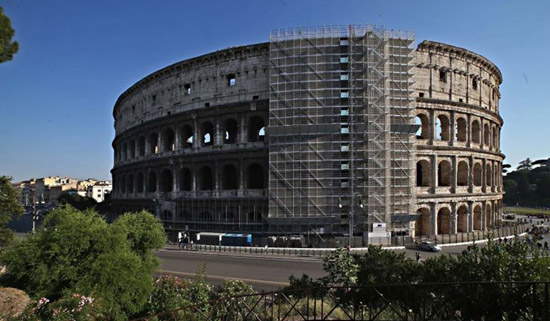Rome, end of 2016. The junta led by Ignazio Marino, overwhelmed by yet another aftermath of the Mafia Capitale investigation, falls thunderously. In its place takes office a mayor from the renzian area who, to boost (according to him) the world image of the Eternal City, launches a singular project: to build a mega panoramic elevator leaning against the Colosseum. For some months now, the credo of Italian politics has become that of speed of action and execution: there is no time to stop and think, it is necessary to do everything in a hurry in order to avoid stopping the machine of the economy, reforms, marketing, and revitalization. Thus, the new mayor decides not to listen at all to the resounding protests of almost the entire world of cultural heritage and people who care about the protection of the historical-artistic heritage, and immediately proceeds to forward the request for permission to the Special Superintendence for Archaeological Heritage of Rome. However, due to yet another cutback in the Ministry of Cultural Heritage, the staff of the Superintendency is severely understaffed and, despite the uproar raised by the mayor’s initiative, it is unable to find time to respond to the request because the scarce staff is all focused on the fight against the degradation of Rome’s cultural heritage, resulting in a considerable lengthening of bureaucratic time. Thirty days thus elapsed without the Superintendency being able to respond to the municipality, and due to a law passed in 2015, the request was to be considered approved. On April 21, 2017, the anniversary of the founding of Rome, the mayor cuts the ribbon on the construction site that will provide the Colosseum with its new, pharaonic panoramic elevator.
Science fiction? For now, fortunately, yes. But there are the preconditions through which the story told above could turn into tremendous reality. Indeed, the Public Administration Bill, known as the Madia Bill because it was presented by Minister Marianna Madia (yes, this is the same one we talked about regarding the discriminatory amendment that could introduce the possibility of evaluating a candidate in a public competition according to the university from which he or she comes), is being debated in the Senate right now. Article 3 provides for the introduction of silence of assent between administrations in cases where the acquisition of consents, concerts or nihil obstat is required for the adoption of regulatory or administrative measures falling under the jurisdiction of public administrations: the deadline is 30 days extendable by another 30 if the administration that must grant assent formulates changes to the request. It is Paragraph 2 that specifies this: “once the time limit referred to in Paragraph 1 has elapsed without the assent, concert or clearance having been communicated, the same shall be deemed to have been acquired.” In short: if the administration that has to authorize a request does not respond in time within 60 days (increased to 90 by an amendment approved in the last few hours), the principle of silence assent applies, and the authorization will be automatically issued. Paragraph 3 lets us know what the fields of application are: "the provisions of paragraph 1 shall also apply to cases in which the acquisition of consents, concerts or nulla osta, however denominated, of administrations in charge of environmental, landscape-territorial, cultural heritage and citizens’ health protection is required, for the adoption of regulatory and administrative measures falling under the jurisdiction of state administrations or other public administrations."
 |
| Don’t worry... this is just the photo of the recent restoration of the Colosseum, published in Mo(n)stre |
It seems clear howextremely dangerous this stunt would be for the protection of the environment, landscape, cultural heritage, and even the health of citizens. A clearly Berlusconian idea that risks throwing the country into the hands of the wildest cementification, the destruction of coasts and mountains, the disregard of landscape and architectural constraints, and the distortion of historical-artistic heritage. According to Legambiente, “Silenzio assenso on environmental assets is an old and wrong recipe for the problems of response times from the public administration”: so old and so wrong that even the Minister of Cultural Heritage, Dario Franceschini, has reportedly called for its cancellation. None of the insiders, clearly, are in favor of it: according to Raffaele Cantone, president of the Anti-Corruption Authority, silence consent is an institution that “is objectively scary and should be used considering what it operates on.” The Superior Council of Cultural Heritage, meeting on July 14, called silence of consent, in no uncertain terms,"a crude and dangerous tool."
We all understand the need that led to the birth of this monster: the need to shorten the time of bureaucracy and speed up the process of issuing consents and clearances. But if the question is right, the answer is completely wrong: it is not possible to give the potential green light to the worst nefarious acts against art and landscape just to make relations between administrations faster. As Giuliano Volpe, president of the Superior Council of Cultural Heritage, rightly wrote to Minister Franceschini in an open letter on June 30, “in such a delicate field as the protection and enhancement of cultural and landscape heritage, an explicit technical evaluation by the competent offices is absolutely necessary, also because of an obvious need for their accountability in such important choices.” Then, wasn’t it better to think of different solutions to remedy the problem of slow relations with public administrations? Perhaps by putting those offices suffering from chronic staff shortages at full capacity, thus investing in service efficiency? Or, if you really don’t want to put your hand to investment, at the very least provide penalties for those offices (and their managers) that do not respond within certain time limits? Too difficult: then indeed scrap the environment, landscape and art as well. With good peace to those who still think that Italy is the country of beauty, and that its administrators want to defend it.

The author of this article: Federico Giannini
Nato a Massa nel 1986, si è laureato nel 2010 in Informatica Umanistica all’Università di Pisa. Nel 2009 ha iniziato a lavorare nel settore della comunicazione su web, con particolare riferimento alla comunicazione per i beni culturali. Nel 2017 ha fondato con Ilaria Baratta la rivista Finestre sull’Arte. Dalla fondazione è direttore responsabile della rivista. Nel 2025 ha scritto il libro Vero, Falso, Fake. Credenze, errori e falsità nel mondo dell'arte (Giunti editore). Collabora e ha collaborato con diverse riviste, tra cui Art e Dossier e Left, e per la televisione è stato autore del documentario Le mani dell’arte (Rai 5) ed è stato tra i presentatori del programma Dorian – L’arte non invecchia (Rai 5). Al suo attivo anche docenze in materia di giornalismo culturale all'Università di Genova e all'Ordine dei Giornalisti, inoltre partecipa regolarmente come relatore e moderatore su temi di arte e cultura a numerosi convegni (tra gli altri: Lu.Bec. Lucca Beni Culturali, Ro.Me Exhibition, Con-Vivere Festival, TTG Travel Experience).
Warning: the translation into English of the original Italian article was created using automatic tools. We undertake to review all articles, but we do not guarantee the total absence of inaccuracies in the translation due to the program. You can find the original by clicking on the ITA button. If you find any mistake,please contact us.